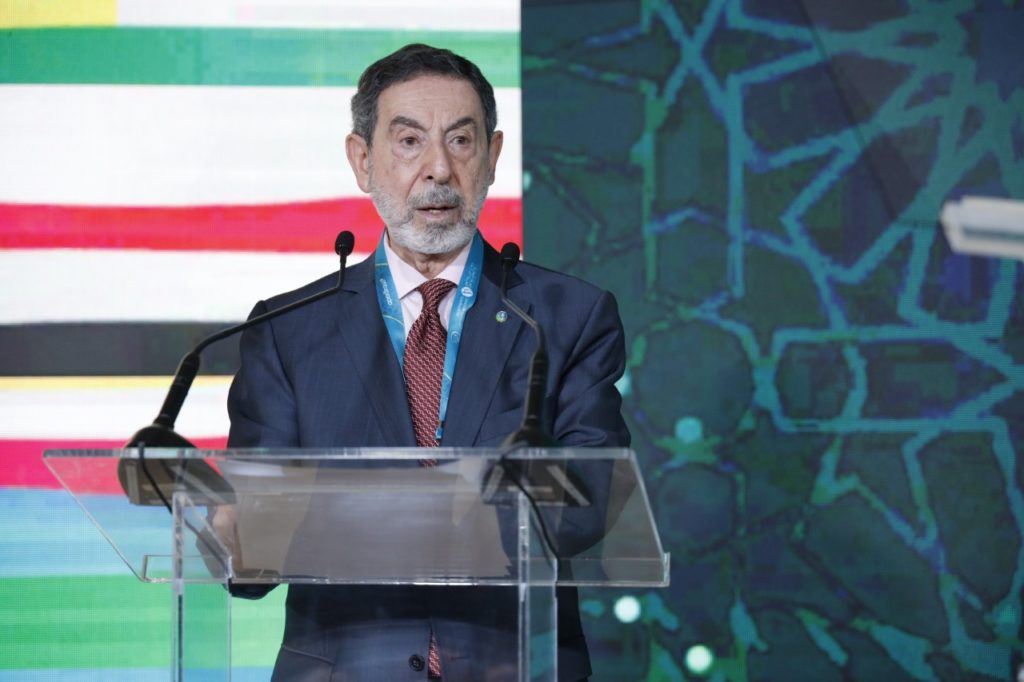São Paulo – The COVID-19 pandemic and the conflict in Eastern Europe are reshaping global trade. So said Arab Brazilian Chamber of Commerce (ABCC) president Osmar Chohfi on Monday (4) in the opening ceremony of the Economic Forum Brazil & Arab Countries held by the ABCC in a hybrid format with an in-person part in São Paulo.
Chohfi said that reciprocity and cooperation are some of the new pillars of the international relation. “The experiences all countries have gone through during the COVID-19 pandemic and the Eastern European conflict have made it clear that global trade must be based on very solid foundations of closeness, reciprocity, cooperation and technology,” he said.
Chohfi said that the ABCC got ahead of this transformation process by creating the first blockchain-based customs clearance system between Brazil and the Arab countries. “Our customs clearance module Easy Trade, now integrated with our Ellos platform, allow us to validate freight documents in a totally digital, paperless manner within a previously unconceivable timeframe of up to two days,” he said.
The president discussed the current level of Brazil-Arab relations. According to him, the North Africa, Levant and Arabian Gulf markets are no major destinations for Brazilian agribusiness, and Brazil plays a crucial role in the food security of 420 million Arabs.
“On the other hand, the Arab countries contribute towards Brazil’s competitiveness by ensuring the supply of hydrocarbons and some of the fertilizers our agribusiness demands,” Chohfi said. The ABCC’s president pointed out that Brazil-Arab trade reached USD 24 billion last years and grows year after year, towards a more balanced relation between both sides.
According to Chohfi, high value-added goods are increasingly more present in trade, benefited from the implementation of free trade agreements like Mercosur-Egypt’s. “More agreements of this kind are necessary, and in this forum, we can look at how to overcome obstacles that hinder discussions towards entering into new free trade agreements between Brazil and the Arab countries,” the president said.
The forum, which focuses on Legacy and Innovation, celebrates the 70th anniversary of the ABCC. Chohfi talked a little about this story to the audience. The institution was founded in 1952 by Arab businesspeople, their children and grandchildren. According to the president, they saw in trade a way to deepen ties and build bridges between Brazil and the countries of origin of their ancestors.
“In these 70 years the ABCC has become a reference in quality business intermediation that are safe for Arab and Brazilian companies in search of mutually beneficial business,” he said. According to him, this relation gained momentum in a time that just like now required the countries to adapt to a new, challenging economic and trade landscape.
“I’m talking about the 70s and 80s, when Brazil, in accordance with its balancing policies, intensified its trade with the Arab world, a trend that grew further in the 90s and over the first two decades of the twenty-first century,” he said. According to him, oil, gas, fertilizers, vehicles, planes, construction materials, and engineering services have enriched trade since then.
Chohfi called everyone to discuss how to deepen Brazil-Arab trade ties and essential questions about the future of the Brazil-Arab partnership in the Economic Forum Brazil & Arab Countries. The meeting gathers authorities, diplomats, experts and businesspeople from the two regions.
The Economic Forum Brazil & Arab Countries is held by the ABCC in partnership with the Union of Arab Chambers, supported by the League of Arab States and sponsored by Travel Plus, Brazil Trade and Investment Promotion Agency (ApexBrasil), Fambras Halal, Embraer, Itaipu Technology Park, Pantanal Trading, Embratur, Khalifa Industrial Zone Abu Dhabi (KIZAD), Cdial Halal, Modern Living, BRF, Egyzone/Am Development, Antika/Openet BV, First Abu Dhabi Bank, Egyptian Financial & Industrial Co. (EFIC), Suez Company for Fertilizers Production (SCFP), Boa Esperança Agriculture Cooperative (CAPEBE), Prima Foods, and Afrinvest.
Here’s more on the Economic Forum Brazil & Arab Countries.
Translated by Guilherme Miranda




